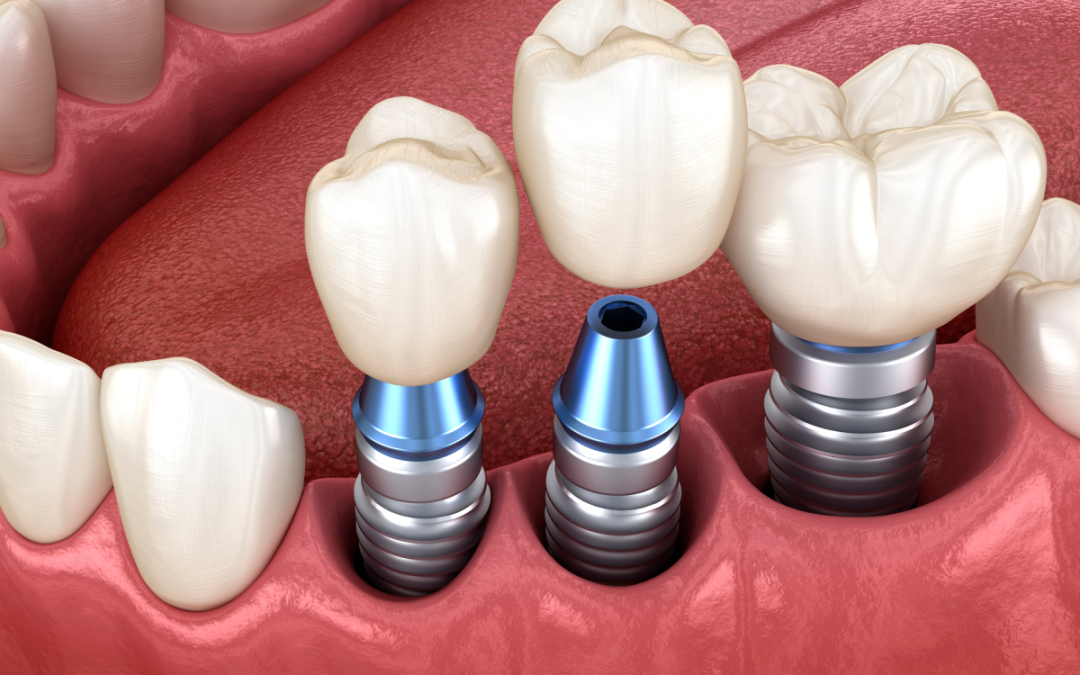Introduction
Missing teeth can have a considerable impact on one’s life. It can lower self-esteem, create difficulty in biting and chewing, and eventually lead to bone loss in the jaw. Fortunately, dental implants have become a popular solution to replace missing teeth. With dental implants, patients can replace a single tooth, multiple teeth, or even a full set of teeth to restore their smile’s natural look and function. However, dental implants cost can be a significant concern, particularly for those without dental insurance. In this blog post, we’ll explore the factors contributing to dental implant costs per tooth and some tips for saving money on the procedure.
Explanation of What Dental Implants Are
A dental implant is an artificial tooth root surgically placed into the jawbone. The implant is made of titanium, a biocompatible material that fuses with the jawbone to provide a stable foundation for replacement teeth. Dental implants are a way to replace missing teeth, whether a single tooth or several teeth. Dental implants are now the gold standard in tooth replacement options, offering natural-looking and long-lasting results.
Dental implants play a vital role in dental health as they help prevent bone loss in the jaw. The jaw bone may recede when a tooth is lost, causing other teeth to shift and loosen, creating bite problems and changing the overall facial structure. A dental implant replaces the missing tooth root that stimulates the jawbone, ensuring it remains healthy and strong. Dental implants also provide a good chewing surface, restoring the ability to eat comfortably and speak clearly, and the appearance of natural teeth.
Dental Implant Surgery
Dental implant surgery is performed under local anaesthesia. Patients experience mild discomfort, swelling, and bruising for several days after the procedure. Pain medication can usually manage this. Any risks associated with dental implants are typically negligible. Complications are rare, and dental implants can last a lifetime with proper care. Recovery time can also vary from patient to patient, but it typically takes three to four months for the implant to fuse with the jawbone before it is ready to support a replacement tooth.
Types of Dental Implants
There are two types of dental implants available: endosteal and subperiosteal. Endosteal implants are the most common type and are generally used for single-tooth implants or bridgework. This type of implant requires a strong, healthy jawbone to be successful. Subperiosteal implants, on the other hand, are used for people who have more extensive bone loss. This option is placed under the gum but above the jawbone, allowing the implant to rest on top of the bone without fusing into the bone. It is an alternative to bone grafting, which can be a long and sometimes unpleasant process for some patients.
What Factors Affect the Cost of Dental Implants?
 Number of Teeth Being Replaced
Number of Teeth Being Replaced
The number of teeth that need to be replaced is one of the primary factors affecting dental implant treatment costs. The more teeth that need to be replaced, the higher the cost. In cases where multiple teeth are missing, a dental bridge or multiple dental implants may be required to provide an effective solution. The cost of a dental implant treatment can increase significantly when more teeth are being replaced, making it essential for patients to consider their treatment options with their dentist carefully.
Location of the Dental Clinic
The location of the dental implant clinic can also affect the cost of a dental implant treatment. Dental implant costs may be more expensive in large cities due to higher overhead costs such as rent and salaries. Smaller towns may have lower dental implant costs due to lower overhead costs. It is important to consider both the cost and experience of the dental implant clinician when choosing a location for treatment.
Skill and Experience of the Dentist
The skill and expertise of the dentist performing the dental implant procedure can make a significant difference in the dental implant cost. A highly experienced implant dentist may charge more for their services than an inexperienced one, but their skill and experience can also reduce the risk of complications during the procedure. Choosing a dentist with a proven track record of successful dental implant procedures is essential to ensure the best possible outcome.
Type of Implant Used
When it comes to dental implant placement, the type of implant used can impact the cost of the treatment. Different types of dental implants include endosteal implants placed directly into the jawbone and subperiosteal implants placed under the gum line but above the jawbone.
Multiple teeth implant treatments also require different types of implants, such as implant-supported bridges or implant-retained dentures. Each type of implant has its unique cost factors and considerations. For example, a single tooth implant using a titanium screw may cost less than a ceramic implant that is more durable and visually similar to natural teeth.
Patients with gum disease or weak jawbones may require additional procedures such as bone augmentation, sinus lifts or grafting. These procedures can increase the cost of dental implant treatment. Additionally, patients with missing or damaged teeth may need other dental treatments before receiving dental implants, such as tooth extraction or placement of a dental crown.
Materials Used To Make the Implant
The material used to make the dental implant can also affect the dental implant treatment cost. Dental implants can be made from various materials, including titanium, zirconium, and ceramic. Each material has advantages and disadvantages, including durability, cost, and aesthetics. Patients can discuss the different material options with their dentist to determine the best fit for their needs and budget.
Titanium dental implants are the most commonly used material for dental implants due to their durability and biocompatibility. They integrate well with the jawbone and have a 95% or higher success rate. They are also relatively inexpensive compared to other materials.
Zirconium dental implants are gaining popularity due to their tooth-like colour and natural appearance. They are less likely to show through the gums than titanium implants and are ideal for those with thin gum tissue. However, they are more expensive than titanium implants and may not be suitable for all patients.
Ceramic dental implants are an attractive option for those who want a metal-free implant. They are made of strong, biocompatible material and are highly corrosion-resistant. They are also an excellent choice for those with metal allergies or sensitivities. However, they are more expensive than titanium implants and may not be suitable for patients with a history of grinding their teeth.
Average Cost of Dental Implants Per Tooth
 The average cost of a single dental implant, including surgery and crown, is around $3,000 in the US. However, this can vary depending on various factors, such as the quality of the implant, the skill of the dentist, and whether any additional procedures, such as bone grafting, are required. Regional differences can also play a significant role in the cost of dental implants, with treatments on the East and West coasts tending to be more expensive than on the Midwest and South. This can be due to differences in overhead costs, skill levels, and demand.
The average cost of a single dental implant, including surgery and crown, is around $3,000 in the US. However, this can vary depending on various factors, such as the quality of the implant, the skill of the dentist, and whether any additional procedures, such as bone grafting, are required. Regional differences can also play a significant role in the cost of dental implants, with treatments on the East and West coasts tending to be more expensive than on the Midwest and South. This can be due to differences in overhead costs, skill levels, and demand.
The cost of dental implants per tooth in Europe can start from €1,000, depending on the country. In Asia, the average cost of dental implants per tooth can start from $1,500, depending on the location. The cost of dental implants per tooth in other countries may be lower or higher than the ones mentioned above.
Australia is a popular destination for dental tourism as it offers high-quality dental care at an affordable cost compared to other countries such as the US, Canada or Europe. The dental professionals in Australia are well-trained and experienced in dental implant treatment, and the dental practices adhere to the highest safety and hygiene standards. Moreover, Australia has a vast range of tourist attractions and natural wonders, making it an exciting and enjoyable place for a dental vacation. According to the National Dental Fee Survey, the average cost of dental implants in Australia starts from $3,000 per tooth, depending on the type of implant and procedure involved. The cost may be higher for a single dental implant if bone grafting or other dental treatments are required. However, dental insurance or dental health insurance benefits may help cover part of the cost of dental implants.
How To Save Money on Dental Implants
Consider Dental Insurance Coverage for Implants
Although most dental insurance policies don’t cover dental implants, some plans may offer partial coverage that can help reduce the overall cost of treatment. It’s worth checking with your dental insurance provider if they offer benefits for a dental implant. If your dental plan doesn’t currently cover implants, explore upgrading your policy to one that does.
Alternatives to Dental Implants
When it comes to replacing missing teeth, people may consider several alternatives to dental implants. One option is dental bridges, which are less expensive than implants and involve attaching an artificial tooth to adjacent natural teeth. However, bridges require the support of healthy teeth and may not be suitable for patients with multiple missing teeth or weak natural teeth.
Another alternative is dentures, which can be removable or fixed. While they are more affordable than dental implants and do not require surgery, they can feel bulky and uncomfortable. Dentures also need regular adjustments as the jawbone changes shape over time.
A less common option is a tooth-supported bridge, which involves anchoring an artificial tooth to a neighbouring tooth using a crown. This method can be effective in certain cases but may be better for patients with missing teeth in different parts of the mouth.
Despite these alternatives, dental implants remain the preferred choice for many patients due to their durability, natural appearance, and ability to prevent bone loss in the jaw. While they may be more expensive initially, they often last a lifetime and require little maintenance compared to other options. Additionally, dental insurance benefits may cover a portion of the cost of dental implants.
Ultimately, the decision to opt for dental implants or an alternative treatment should be made in consultation with a dentist, considering factors such as budget, oral health, and personal preferences.
Conclusion
Dental Implant costs can range tremendously, but several factors contribute to the costs. With financing or payment plan options, the cost of dental implants can be spread out, making it a more manageable expense. Remember, the procedure can be uncomfortable or painful, but the results can significantly improve a patient’s smile and overall health. Consult with our dental professionals to determine the best action for your needs. Contact us today to schedule your first appointment!
Note: Any surgical or invasive procedure carries risks. Before proceeding, you should seek a second opinion from an appropriately qualified health practitioner.
References:
Dental Implants. Part I: Biological basis, implant types, and the peri-implant sulcus https://pubmed.ncbi.nlm.nih.gov/8699485/
Dental implants and how crucial replacing teeth really is https://www.dentalhealth.org/Blog/dental-implants-and-how-crucial-replacing-teeth-really-is

